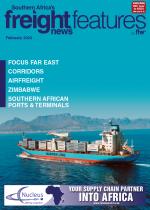There have been major developments in transport and trade in Africa, particularly in East and southern Africa, according to Tiago Pocinho, country manager of Rangel South Africa and Zambia.“There is still a lot of room for progress, and countries such as Uganda, Rwanda, Tanzania, Kenya, and Malawi have been growing in importance on the continent, with these corridors expected to deliver significant growth.”Pocinho said Rangel had made major advances in strategic positioning on several continents. “With a presence in the ports of Luanda and Lobito in Angola, Maputo and Beira in Mozambique, Dar es Salaam in Tanzania, Cape Town and Durban in South Africa, and Namibia’s Walvis Bay, it has allowed us to speed up the export and import processes of all our clients' goods.”Speaking to Freight News, Pocinho said plans were in place to expand operations further and several other corridors had been identified for this purpose.“Currently our focus has been on the corridors where we have regular departures, but we continue to experience an increase in volumes for road transport – and with that in mind, we have embarked on a strategy to grow our footprint.”Pocinho attributed growing volumes to the intensification of mineral exploration in Africa and the instability of maritime transport.“More and more markets see the African continent as a solution to the great demand for raw materials, and we believe that in the coming years decisive investments will be made in this direction,” he said. “With this increase in international commercial transactions, it will be necessary to adapt the infrastructure so that it can respond positively and effectively to ensure better movement of goods between countries. In SADC countries there is still a long way to go to bring them up to par with the other market practices on the African continent.”According to Pocinho, there is an urgent need to improve the conditions and infrastructure of the borders, particularly at Komatipoort, Groblersbrug and Zeerust, due to the large traffic f low through these borders. There is also an urgent need to improve the cargo processing system so that truck customs clearance becomes faster and more agile.He said there were also other challenges currently facing the industry, particularly border congestion. “It is important for companies to correctly place themselves in the market to overcome these challenges. For us, at Rangel, we have created connections to facilitate the cross-border and distribution process to ensure we can shorten the delivery time of our clients’ goods and merchandise.”He said the pandemic had driven a paradigm shift in the supply chain to minimise the risk of excessive dependence on single sources of production, leading to many countries and companies having to consider moving from a just-in-time to a just-in-case logic. “Thus, the goal will be to diversify sources.”

